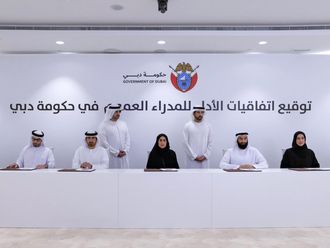Geneva: The UAE is striving to draw up policies for temporary employment contracts, not just to meet the needs of the job market, but also take into consideration national social challenges that may arise.
The remarks were made by Humaid Bin Deemas Al Suwaidi, Assistant Undersecretary for Labour Affairs at the Ministry of Human Resources and Emiratisation, during his speech at a meeting of the committee for addressing governance challenges in a changing labour migration landscape, which was held as part of the 106th meeting of the International Labour Organisation (ILO).
Al Suwaidi pointed out that the UAE launched in 2014 its National Agenda for 2021, which aims to build a competitive knowledge-based economy that attracts exceptional talents. The National Agenda will also introduce a regulatory and legislative framework that will help these talents grow and develop, allowing them to utilise their capabilities and boost productivity in an ideal manner.
“The UAE government plays a pivotal role in achieving this ambition by developing policies that attract foreign labour and legislations that regulate the labour market. In 2016, the government approved a bundle of legislations that consolidated the principle of contractual transparency based on the informed consent of both employer and employee” said Al Suwaidi.
Al Suwaidi stressed the importance of cooperation, partnerships and dialogue between all involved parties in order to approve a governance system for managing and addressing issues pertaining to contracts for temporary employment.
Al Suwaidi pointed out that one of points of the focus of the Abu Dhabi Dialogue concerned the development of a framework that is based on comprehensive and consistent policies to manage the entire cycle of temporary contractual work, which in turn contributes to the economic development of the countries sending and receiving the workers.












